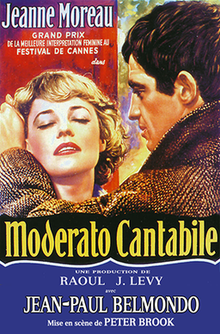Peter Brook, better known for his theatrical work, directed Seven Days… Seven Nights, based on the 1958 novel “Moderato cantabile{ by Marguerite Duras (Hiroshima, Mon Amour, 1959).
Grade: C+ (** out of *****)
| Seven Days… Seven Nights | |
|---|---|

Film poster
|
|
The film world premiered at the 1960 Cannes Film Fest, where Jeanne Moreau won Best Actress.
Moreau plays Anne Desbarèdes, a young woman married to a wealthy businessman, living mundane existence in a small comm town, Blaye.
After indirectly witnessing a murder in a café, she returns to the scene of the crime, where she meets Chauvin. A charmer, he informs her in more detail about the events that took place.
Mentally unbalanced, Anne begins to believe that Chauvin intends to kill her.
The film was released in the U.S. as Seven Days… Seven Nights in 1964.
Peter Brook secured the film rights and offered the lead to Jeanne Moreau, whom he had directed in the Paris production of Tennessee Williams’ Cat on a Hot Tin Roof.
However, Brook’s only other film, The Beggar’s Opera, had flopped at the box-office flop, so it was difficult raising money. After a year of financial, artistic and emotional blackmail and diplomacy, Raoul Levy decided to produce it.
Levy described the film as “a romantic suspense story with only uses two principals. Through a passive love story, we learn how a crime of passion was committed.”
Levy wanted Simone Signoret to play the female lead, but Brook wanted Moreau, Moreau and Duras enjoyed complete artistic control due to their contract.
Levy did not understand the script but was convinced that if Brook, Moreau and Duras saw something in it, something must be there.” Levy did not show the script to financiers; instead, he told them: “Look here, you turned down The 400 Blows because you couldn’t understand the script, you turned down Hiroshima Mon Amour; well, I can’t make head nor tail of this script and what’s more I’m not even going to show it to you – but I want 30 million francs.” As a result, Levy was secured the funding that he had sought.
The male lead was offered to Richard Burton: “This one is for art, not money. For classical actor, the key thing is variation – unusual kinds of things in different media. It’s all a matter of expanding one’s acting range.”
However, Burton was forced to withdraw, putting the blame 0n French unions, who objected to British actor in a French production, even though Brook was not French.
Belmondo replaced Burton, selecting the role instead of a theatre role; he would not appear on stage for over 25 years.
During filming, Belmondo was involved in an automobile accident while driving that injured Moreau’s son.
The film performed well at the box office in Paris but struggled elsewhere.
Duras liked the film, but Belmondo, who preferred making adventure films, disliked the picture: It was boring. Like Antonioni’s films, Duras’ script was full of sous-entendus (hidden meanings). Everyone was looking something significant in every expression. You didn’t just drink a glass of wine. You asked yourself, ‘Why does she want me to drink it?’
Cast
Jeanne Moreau as Anne Desbarèdes
Jean-Paul Belmondo as Chauvin
Pascale de Boysson as bar owner
Jean Deschamps as M. Desbarèdes
Didier Haudepin as Pierre
Colette Régis as Miss Giraud
Valeric Dobuzinsky as Assassin (as Valéric)
Credits:
Directed by Peter Brook
Written by Gérard Jarlot, Marguerite Duras, based on her 1958 novel, “Moderato cantabile
Produced by Raoul Lévy
Cinematography Armand Thirard
Edited by Albert Jurgenson
Release dates: May 25, 1960 (France); January 1964 (USA)
Running time: 95 minutes
Budget 30 million francs.
Box office 978,012 admissions (France)










